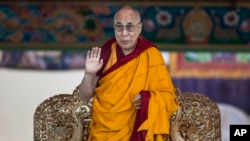The Dalai Lama has again been refused entry into South Africa where he was going to attend a world summit of Nobel Peace Laureates in Cape Town, his South African representative said.
It is the third time the country has refused him entry. In the past, South Africa has cited concerns about angering China for refusing to grant a visa to the Dalai Lama.
The refusal could provoke a boycott of the 14th annual peace summit, according to a spokesman for South African laureate and former archbishop Desmond Tutu.
The Dalai Lama, the spiritual leader of the disputed Tibet region, lives in exile in India and is at loggerheads with Beijing over Tibet.
Economic, political clout
China, which accuses the Dalai Lama of covertly campaigning for Tibet's independence, regularly uses its growing economic and political clout to put pressure on governments around the world to limit contact with the Dalai Lama.
China is one of South Africa's major trading partners.
The South African Foreign Ministry confirmed that its High Commission in New Delhi had received the Dalai Lama's visa application but denied it had been rejected, saying it was being subjected to “normal due process.”
“The relevant authorities will communicate with the applicant thereafter,” spokesman Clayson Monyela said.
The Dalai Lama was welcomed to South Africa in 1996 and met with Nelson Mandela, the country's first black and democratically elected president.
But in 2009, the South African government kept the Dalai Lama from attending a Nobel laureates' peace conference, saying it would detract attention from the 2010 soccer World Cup that was hosted here.
The spiritual leader later made plans to travel to South Africa in October 2011 to attend the 80th birthday party of a fellow Nobel laureate Tutu. The South African government did not issue the visa and the Dalai Lama ultimately withdrew his application.
A South African court in 2012 ruled that officials "unreasonably delayed" a decision about whether to grant the Dalai Lama a visa for the 2011 trip, largely out of fears of angering the Chinese government.
The Nobel summit in Cape Town in October is backed by foundations representing four South African peace laureates - Tutu, Nelson Mandela, F.W. de Klerk and Albert Luthuli.
Along with the surviving South Africans - Tutu and De Klerk - the organizers said 13 individuals and eight organizations had confirmed that they would attend the summit, including former Soviet president Mikhail Gorbachev.
Criticizes boycott
But a spokesman for De Klerk, the South African former president who won the Nobel prize alongside liberation icon Nelson Mandela, said he did not think a boycott of the summit would be the right response.
"I think the message has gone out that boycotting the summit would be the very worst way of protesting," Dave Steward, executive director of the FW de Klerk Foundation, told the French news agency AFP.
"The best way would be to come to the summit and celebrate the 20th anniversary of our democracy and then make any views they want to make known at the summit."
He said a refusal of a visa for the Dalai Lama would be "the antithesis of the values of our constitution."
Cape Town mayor Patricia de Lille, who is organizing next month's conference, said, “We remain hopeful that the national government will grant the visa in order to spare South Africa the international humiliation of failing to do so."
Material for this report comes from Reuters, AFP and AP.





